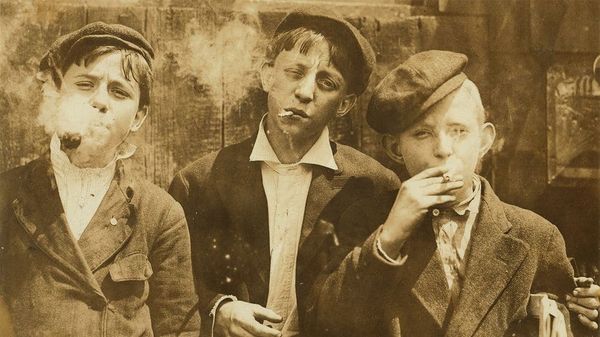
Elaine Stritch during the Q&A
 |
| Teenage. Jon Savage: "Both Matt and I are idealistic about youth. |
I said before Tribeca started that the trick for director Nicholas Wrathall would be to assemble the life and times of Gore Vidal into a film that didn't burst at the seams. The essayist and commentator was a man who loved the camera and so in addition to his written work, Wrathall also had decades of archival footage to draw on, although the crowning glory of his film is his own first-person interviews with Vidal before his death. The end result is a surprisingly intimate portrait that mixes the personal with the political to give not just a sense of the man but also the importance to the world of iconoclasts like him, who kick against the establishment.
Speaking to Wrathall about the film (Read the full interview here), he said that he really wanted to "get his [Vidal's] word out".
He added: "There's a much younger generation who know very little about him - that motivated me. And the politics motivated me really deeply. I thought, who else is addressing power and speaking this kind of truth to power in American society? Who else? And he's not going to be around too much longer - I have to make this film."
Equally open about nearing the end of her life is the indomitable Elaine Stritch. The Broadway legend, now 88, allowed Chiemi Karasawa an incredible amount of access to her life to make her directorial debut. Stritch may have vulnerabilities - evident in the emotionally charged Tribeca Talks After The Movie event - but she is not afraid of them. Her fearlessness in the face of age and illness dominates the film, although its a shame that Karasawa couldn't fit a little more background information in around the edges. I couldn't help but think back to Joan Rivers: A Piece Of Work - it's a shame both filmmakers chose self-deprecating titles, incidentally.
Both women are incredibly powerful in their own way and yet have taken entirely different tacks when it comes to the ageing process. While Rivers is infamous for her love of plastic surgery, Stritch is the polar opposite and says, cheeringly, during the talk with Karasawa, her musical director and dear friend Rob Bowman and theatre critic Charles Isherwood afterwards, "I love the way I look." So do we, Elaine and more than that, we love that you're not ashamed to say it.
If Vidal and Stritch were always larger than life, so, in her own way, was Megan Boyd. An eccentric Scotswoman, who lived in the northerly Scots village of Brora, her fame was the quiet sort that spread through dint of her artistry. Boyd, you see, was a salmon fly-maker whose creations were so exquisite that they even snared her the Prince of Wales as a client. Eric Steel's poetic documentary explores the life of Boyd - who died in 2001 - through interviews with those who knew her, bolstering his film with beautifully shot images of salmon fly-makers at work and sweeping animation from Em Cooper. Boyd is only glimpsed in the last moments of the film and, when I spoke to Steel about the film, he explained why that was.
"I think there were two parts to it," he said. "One is, that when I clipped her obituary in the New York Times [which forms the jumping off point for the film], I know there was a picture there. But I didn't clip that out. I took the words and I put them on the wall. So I think, there was a long period from 2001 until when I started making this that her image was never really part of my thinking of how the story developed. It really was something that was going on in my imagination - I imagined her.
"I think, I wanted the audience to have to let go and step into the world and step into the stories in the same way a fisherman steps into a river and I really wanted them to be a part of it without having the playbook, without having the image. Once you see her, I think that's the conundrum of all human stories, once you see her you can make a snap judgement about who people are."
If humans are prone to snap judgements, we also have a love of labels, liking nothing more than to pop people into a category, so it's a surprise to learn that the concept of being a 'teenager' is a relatively recent one, coined by a New York Times article in 1945. Matt Wolf's film - based on the book by Jon Savage - is an exhilirating ride through the last days of the 19th century and the first half of the 20th, as young people fought the World Wars they were sent on by their parents at the same time as battling for control of their own place in society. Wolf and his team have assembled a fabulous amount of footage, from Britain, the US and Germany and he weaves in a small amount of re-enactment to further personalise the story of rebellion and hope which every generation claims as their own.
Speaking about the tension between teenagers wanting to control their own lives and adults inflicting their own views upon them, Savage told me: "We wanted to have the struggle. We didn't just want to have a rock and roll years - wahay, wasn't it all fabulous, you know, here were flappers, here were swing kids - because that wasn't the context. The context were these wider forces and the context was the mass society and the drive towards regimentation and homogenisation that existed then."
Wolf added: "We felt by focusing on the early 20th century, the pre-history of teenagers and these three countries, that we could tell a kind of definitive story about how ideas of youth found a form at the end of World War II and that form was the teenager."
Given that Teenage and Kiss The Water are playing with documentary form, I think it's only appropriate to mention the restored print of Shirley Clarke's film Portrait Of Jason, which I also saw this week. The film, a straight to camera interview with an increasingly drunk and high gay black prostitute in 1967, is keen to declare itself as, in some ways, a manipulation. We hear Jason Holliday asked for "material" and badgered to the brink of tears, so we are privvy to the mechanics as well as the result.
Speaking after the premiere of the restoration of the film at New York's IFC cinema, Shirley's daughter Wendy said: "This is Jason. I knew Jason, we all hung out. I remember going to parties and he would pull his poppers out. This is just him, what he's always like. There was nothing that unusual in a way. It was an amazing chance for him to have his life preserved. Now, he'd be really happy."






















